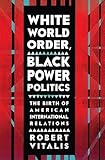White World Order, Black Power Politics : The Birth of American International Relations / Robert Vitalis.
Material type: TextSeries: The United States in the WorldPublisher: Ithaca, NY : Cornell University Press, [2016]Copyright date: ©2017Description: 1 online resource (288 p.)Content type:
TextSeries: The United States in the WorldPublisher: Ithaca, NY : Cornell University Press, [2016]Copyright date: ©2017Description: 1 online resource (288 p.)Content type: - 9781501701887
- Imperialism -- Historiography
- International relations -- Study and teaching (Higher) -- United States -- History -- 20th century
- Racism in higher education -- United States -- History -- 20th century
- Discrimination & Race Relations
- Political Science & Political History
- U.S. History
- POLITICAL SCIENCE / International Relations / General
- global affairs
- global diplomacy
- global governance
- global power
- imperialism
- political science
- race relations in 20th century
- race relations
- racism and imperialism
- racism in higher eduction
- 327.730089 96073 23
- online - DeGruyter
| Item type | Current library | Call number | URL | Status | Notes | Barcode | |
|---|---|---|---|---|---|---|---|
 eBook
eBook
|
Biblioteca "Angelicum" Pont. Univ. S.Tommaso d'Aquino Nuvola online | online - DeGruyter (Browse shelf(Opens below)) | Online access | Not for loan (Accesso limitato) | Accesso per gli utenti autorizzati / Access for authorized users | (dgr)9781501701887 |
Frontmatter -- Contents -- Preface -- Acknowledgments -- Introduction -- Part I. The Noble Science of Imperial Relations and Its Laws of Race Development -- Part II. Worlds of Color -- Part III. The North versus the Black Atlantic -- Part IV. “The Dark World Goes Free” -- Conclusion -- Notes -- Bibliography -- Index
restricted access online access with authorization star
http://purl.org/coar/access_right/c_16ec
Racism and imperialism are the twin forces that propelled the course of the United States in the world in the early twentieth century and in turn affected the way that diplomatic history and international relations were taught and understood in the American academy. Evolutionary theory, social Darwinism, and racial anthropology had been dominant doctrines in international relations from its beginnings; racist attitudes informed research priorities and were embedded in newly formed professional organizations. In White World Order, Black Power Politics, Robert Vitalis recovers the arguments, texts, and institution building of an extraordinary group of professors at Howard University, including Alain Locke, Ralph Bunche, Rayford Logan, Eric Williams, and Merze Tate, who was the first black female professor of political science in the country.Within the rigidly segregated profession, the "Howard School of International Relations" represented the most important center of opposition to racism and the focal point for theorizing feasible alternatives to dependency and domination for Africans and African Americans through the early 1960s. Vitalis pairs the contributions of white and black scholars to reconstitute forgotten historical dialogues and show the critical role played by race in the formation of international relations.
Mode of access: Internet via World Wide Web.
In English.
Description based on online resource; title from PDF title page (publisher's Web site, viewed 26. Apr 2024)


